标签:username sub 事务配置 mit junit4 自动 win value 共享
l AOP :切面编程
切面:切入点 和 通知 结合
l spring aop 编程
|
<aop:config> 方法1: <aop:pointcut expression="切入点表达式" id=""> <aop:advisor advice-ref="通知引用" pointcut-ref="切入点的引用">
方法2: <aop:advisor advice-ref="通知引用" pointcut="切入点表达式">
|
l AspectJ xml
|
<aop:config> <aop:aspect ref="切面类"> <aop:pointcut> <aop:before> 前置 <aop:afterReturning returning="第二个参数名称"> 后置 <aop:around> 环绕 <aop:afterThrowing throwing="第二。。。"> 抛出异常 <aop:after> 最终 |
l AspectJ annotation
@Aspect
@Pointcut("表达式") private void xxx(){}
@Before @...
l 切入点表达式
<aop:pointcut expression="execution(* com.itheima.crm.*.service..*.*(..))" id="">
l 事务:一组业务操作ABCD,要么全部成功,要么全部不成功。
l 特性:ACID
原子性:整体
一致性:完成
隔离性:并发
持久性:结果
l 隔离问题:
脏读:一个事务读到另一个事务没有提交的数据
不可重复读:一个事务读到另一个事务已提交的数据(update)
虚读(幻读):一个事务读到另一个事务已提交的数据(insert)
l 隔离级别:
read uncommitted:读未提交。存在3个问题
read committed:读已提交。解决脏读,存在2个问题
repeatable read:可重复读。解决:脏读、不可重复读,存在1个问题。
serializable :串行化。都解决,单事务。
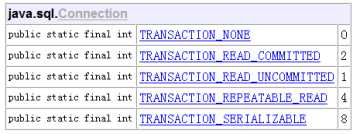
l mysql 事务操作--简单
|
ABCD 一个事务 Connection conn = null; try{ //1 获得连接 conn = ...; //2 开启事务 conn.setAutoCommit(false); A B C D //3 提交事务 conn.commit(); } catche(){ //4 回滚事务 conn.rollback(); } |
l mysql 事务操作--Savepoint
|
需求:AB(必须),CD(可选) Connection conn = null; Savepoint savepoint = null; //保存点,记录操作的当前位置,之后可以回滚到指定的位置。(可以回滚一部分) try{ //1 获得连接 conn = ...; //2 开启事务 conn.setAutoCommit(false); A B savepoint = conn.setSavepoint(); C D //3 提交事务 conn.commit(); } catche(){ if(savepoint != null){ //CD异常 // 回滚到CD之前 conn.rollback(savepoint); // 提交AB conn.commit(); } else{ //AB异常 // 回滚AB conn.rollback(); } } |
transaction --> tx

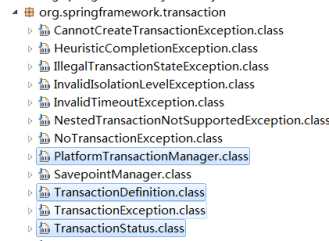
l PlatformTransactionManager 平台事务管理器,spring要管理事务,必须使用事务管理器
进行事务配置时,必须配置事务管理器。
l TransactionDefinition:事务详情(事务定义、事务属性),spring用于确定事务具体详情,
例如:隔离级别、是否只读、超时时间 等
进行事务配置时,必须配置详情。spring将配置项封装到该对象实例。
l TransactionStatus:事务状态,spring用于记录当前事务运行状态。例如:是否有保存点,事务是否完成。
spring底层根据状态进行相应操作。
l 导入jar包:需要时平台事务管理器的实现类

l 常见的事务管理器
DataSourceTransactionManager ,jdbc开发时事务管理器,采用JdbcTemplate
HibernateTransactionManager,hibernate开发时事务管理器,整合hibernate

l api详解
TransactionStatus getTransaction(TransactionDefinition definition) ,事务管理器 通过“事务详情”,获得“事务状态”,从而管理事务。
void commit(TransactionStatus status) 根据状态提交
void rollback(TransactionStatus status) 根据状态回滚

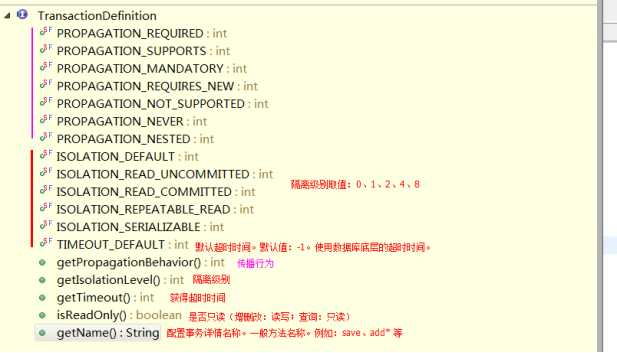
l 传播行为:在两个业务之间如何共享事务。
PROPAGATION_REQUIRED , required , 必须 【默认值】
支持当前事务,A如果有事务,B将使用该事务。
如果A没有事务,B将创建一个新的事务。
PROPAGATION_SUPPORTS ,supports ,支持
支持当前事务,A如果有事务,B将使用该事务。
如果A没有事务,B将以非事务执行。
PROPAGATION_MANDATORY,mandatory ,强制
支持当前事务,A如果有事务,B将使用该事务。
如果A没有事务,B将抛异常。
PROPAGATION_REQUIRES_NEW , requires_new ,必须新的
如果A有事务,将A的事务挂起,B创建一个新的事务
如果A没有事务,B创建一个新的事务
PROPAGATION_NOT_SUPPORTED ,not_supported ,不支持
如果A有事务,将A的事务挂起,B将以非事务执行
如果A没有事务,B将以非事务执行
PROPAGATION_NEVER ,never,从不
如果A有事务,B将抛异常
如果A没有事务,B将以非事务执行
PROPAGATION_NESTED ,nested ,嵌套
A和B底层采用保存点机制,形成嵌套事务。
掌握:PROPAGATION_REQUIRED、PROPAGATION_REQUIRES_NEW、PROPAGATION_NESTED
|
create database ee19_spring_day03; use ee19_spring_day03; create table account( id int primary key auto_increment, username varchar(50), money int ); insert into account(username,money) values(‘jack‘,‘10000‘); insert into account(username,money) values(‘rose‘,‘10000‘); |
l 核心:4+1
l aop : 4 (aop联盟、spring aop、aspectj规范、spring aspect)
l 数据库:2 (jdbc/tx)
l 驱动:mysql
l 连接池:c3p0
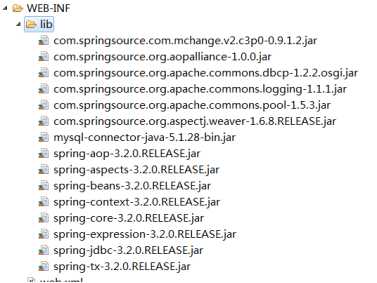
|
public class AccountDaoImpl extends JdbcDaoSupport implements AccountDao {
@Override public void out(String outer, Integer money) { this.getJdbcTemplate().update("update account set money = money - ? where username = ?", money,outer); }
@Override public void in(String inner, Integer money) { this.getJdbcTemplate().update("update account set money = money + ? where username = ?", money,inner); }
} |
|
public class AccountServiceImpl implements AccountService {
private AccountDao accountDao; public void setAccountDao(AccountDao accountDao) { this.accountDao = accountDao; } @Override public void transfer(String outer, String inner, Integer money) { accountDao.out(outer, money); //断电 // int i = 1/0; accountDao.in(inner, money); }
}
|
|
<!-- 1 datasource --> <bean id="dataSource" class="com.mchange.v2.c3p0.ComboPooledDataSource"> <property name="driverClass" value="com.mysql.jdbc.Driver"></property> <property name="jdbcUrl" value="jdbc:mysql://localhost:3306/ee19_spring_day03"></property> <property name="user" value="root"></property> <property name="password" value="1234"></property> </bean>
<!-- 2 dao --> <bean id="accountDao" class="com.itheima.dao.impl.AccountDaoImpl"> <property name="dataSource" ref="dataSource"></property> </bean> <!-- 3 service --> <bean id="accountService" class="com.itheima.service.impl.AccountServiceImpl"> <property name="accountDao" ref="accountDao"></property> </bean> |
|
@Test public void demo01(){ String xmlPath = "applicationContext.xml"; ApplicationContext applicationContext = new ClassPathXmlApplicationContext(xmlPath); AccountService accountService = (AccountService) applicationContext.getBean("accountService"); accountService.transfer("jack", "rose", 1000); } |
l spring底层使用 TransactionTemplate 事务模板进行操作。
l 操作
1.service 需要获得 TransactionTemplate
2.spring 配置模板,并注入给service
3.模板需要注入事务管理器
4.配置事务管理器:DataSourceTransactionManager ,需要注入DataSource
|
//需要spring注入模板 private TransactionTemplate transactionTemplate; public void setTransactionTemplate(TransactionTemplate transactionTemplate) { this.transactionTemplate = transactionTemplate; } @Override public void transfer(final String outer,final String inner,final Integer money) { transactionTemplate.execute(new TransactionCallbackWithoutResult() {
@Override protected void doInTransactionWithoutResult(TransactionStatus arg0) { accountDao.out(outer, money); //断电 // int i = 1/0; accountDao.in(inner, money); } });
} |
|
<!-- 3 service --> <bean id="accountService" class="com.itheima.service.impl.AccountServiceImpl"> <property name="accountDao" ref="accountDao"></property> <property name="transactionTemplate" ref="transactionTemplate"></property> </bean>
<!-- 4 创建模板 --> <bean id="transactionTemplate" class="org.springframework.transaction.support.TransactionTemplate"> <property name="transactionManager" ref="txManager"></property> </bean>
<!-- 5 配置事务管理器 ,管理器需要事务,事务从Connection获得,连接从连接池DataSource获得 --> <bean id="txManager" class="org.springframework.jdbc.datasource.DataSourceTransactionManager"> <property name="dataSource" ref="dataSource"></property> </bean> |
l spring提供 管理事务的代理工厂bean TransactionProxyFactoryBean
1.getBean() 获得代理对象
2.spring 配置一个代理
|
<!-- 4 service 代理对象 4.1 proxyInterfaces 接口 4.2 target 目标类 4.3 transactionManager 事务管理器 4.4 transactionAttributes 事务属性(事务详情) prop.key :确定哪些方法使用当前事务配置 prop.text:用于配置事务详情 格式:PROPAGATION,ISOLATION,readOnly,-Exception,+Exception 传播行为 隔离级别 是否只读 异常回滚 异常提交 例如: <prop key="transfer">PROPAGATION_REQUIRED,ISOLATION_DEFAULT</prop> 默认传播行为,和隔离级别 <prop key="transfer">PROPAGATION_REQUIRED,ISOLATION_DEFAULT,readOnly</prop> 只读 <prop key="transfer">PROPAGATION_REQUIRED,ISOLATION_DEFAULT,+java.lang.ArithmeticException</prop> 有异常扔提交 --> <bean id="proxyAccountService" class="org.springframework.transaction.interceptor.TransactionProxyFactoryBean"> <property name="proxyInterfaces" value="com.itheima.service.AccountService"></property> <property name="target" ref="accountService"></property> <property name="transactionManager" ref="txManager"></property> <property name="transactionAttributes"> <props> <prop key="transfer">PROPAGATION_REQUIRED,ISOLATION_DEFAULT</prop> </props> </property> </bean>
<!-- 5 事务管理器 --> <bean id="txManager" class="org.springframework.jdbc.datasource.DataSourceTransactionManager"> <property name="dataSource" ref="dataSource"></property> </bean>
|

l 在spring xml 配置aop 自动生成代理,进行事务的管理
1.配置管理器
2.配置事务详情
3.配置aop
|
<!-- 4 事务管理 --> <!-- 4.1 事务管理器 --> <bean id="txManager" class="org.springframework.jdbc.datasource.DataSourceTransactionManager"> <property name="dataSource" ref="dataSource"></property> </bean> <!-- 4.2 事务详情(事务通知) , 在aop筛选基础上,对ABC三个确定使用什么样的事务。例如:AC读写、B只读 等 <tx:attributes> 用于配置事务详情(属性属性) <tx:method name=""/> 详情具体配置 propagation 传播行为 , REQUIRED:必须;REQUIRES_NEW:必须是新的 isolation 隔离级别 --> <tx:advice id="txAdvice" transaction-manager="txManager"> <tx:attributes> <tx:method name="transfer" propagation="REQUIRED" isolation="DEFAULT"/> </tx:attributes> </tx:advice> <!-- 4.3 AOP编程,目标类有ABCD(4个连接点),切入点表达式 确定增强的连接器,从而获得切入点:ABC --> <aop:config> <aop:advisor advice-ref="txAdvice" pointcut="execution(* com.itheima.service..*.*(..))"/> </aop:config> |
l 1.配置事务管理器,将并事务管理器交予spring
l 2.在目标类或目标方法添加注解即可 @Transactional
|
<!-- 4 事务管理 --> <!-- 4.1 事务管理器 --> <bean id="txManager" class="org.springframework.jdbc.datasource.DataSourceTransactionManager"> <property name="dataSource" ref="dataSource"></property> </bean> <!-- 4.2 将管理器交予spring * transaction-manager 配置事务管理器 * proxy-target-class true : 底层强制使用cglib 代理 --> <tx:annotation-driven transaction-manager="txManager"/> |
|
@Transactional public class AccountServiceImpl implements AccountService { |
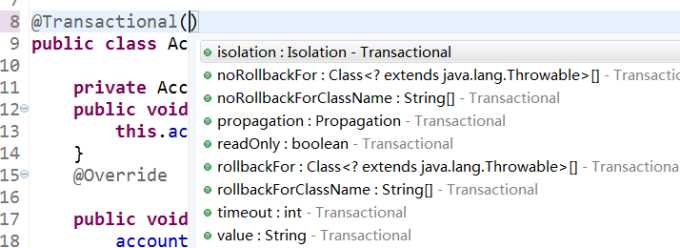
|
@Transactional(propagation=Propagation.REQUIRED , isolation = Isolation.DEFAULT) public class AccountServiceImpl implements AccountService {
|
l 导入jar包
基本 :4+1
测试:spring-test...jar
1.让Junit通知spring加载配置文件
2.让spring容器自动进行注入
l 修改测试类
|
@RunWith(SpringJUnit4ClassRunner.class) @ContextConfiguration(locations="classpath:applicationContext.xml") public class TestApp {
@Autowired //与junit整合,不需要在spring xml配置扫描 private AccountService accountService;
@Test public void demo01(){ // String xmlPath = "applicationContext.xml"; // ApplicationContext applicationContext = new ClassPathXmlApplicationContext(xmlPath); // AccountService accountService = (AccountService) applicationContext.getBean("accountService"); accountService.transfer("jack", "rose", 1000); }
} |
0.导入jar包
spring-web.xml

1.tomcat启动加载配置文件
servlet --> init(ServletConfig) --> <load-on-startup>2
filter --> init(FilterConfig) --> web.xml注册过滤器自动调用初始化
listener --> ServletContextListener --> servletContext对象监听【】
spring提供监听器 ContextLoaderListener --> web.xml <listener><listener-class>....
如果只配置监听器,默认加载xml位置:/WEB-INF/applicationContext.xml

2.确定配置文件位置,通过系统初始化参数
ServletContext 初始化参数 web.xml
<context-param>
<param-name>contextConfigLocation
<param-value>classpath:applicationContext.xml
|
<!-- 确定配置文件位置 --> <context-param> <param-name>contextConfigLocation</param-name> <param-value>classpath:applicationContext.xml</param-value> </context-param>
<!-- 配置spring 监听器,加载xml配置文件 --> <listener> <listener-class>org.springframework.web.context.ContextLoaderListener</listener-class> </listener> |
3.从servletContext作用域 获得spring容器 (了解)
|
// 从application作用域(ServletContext)获得spring容器 //方式1: 手动从作用域获取 ApplicationContext applicationContext = (ApplicationContext) this.getServletContext().getAttribute(WebApplicationContext.ROOT_WEB_APPLICATION_CONTEXT_ATTRIBUTE); //方式2:通过工具获取 ApplicationContext apppApplicationContext2 = WebApplicationContextUtils.getWebApplicationContext(this.getServletContext());
|
struts:2.3.15.3
hibernate : 3.6.10
spring: 3.2.0
struts-2.3.15.3\apps\struts2-blank\WEB-INF\lib
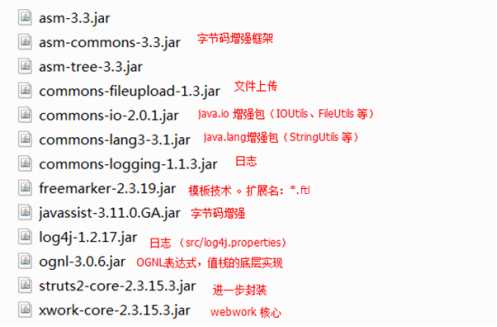

模板技术 ,一般用于页面静态化
freemarker:扩展名:*.ftl
velocity :扩展名 *.vm
l 基础:4+1 , beans、core、context、expression , commons-logging (struts已经导入)
l AOP:aop联盟、spring aop 、aspect规范、spring aspect
l db:jdbc、tx
l 测试:test
l web开发:spring web
l 驱动:mysql
l 连接池:c3p0
l 整合hibernate:spring orm
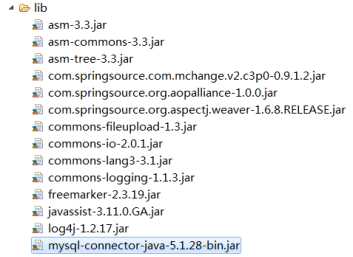
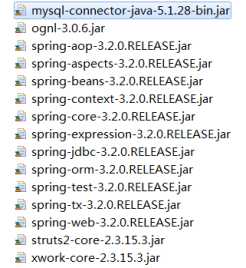
%h%\hibernate3.jar 核心
%h%\lib\required 必须

%h%\lib\jpa jpa规范 (java persistent api 持久api),hibernate注解开发 @Entity @Id 等
l 整合log4j
导入 log4j...jar (struts已经导入)
整合(过渡):slf4j-log4j12-1.7.5.jar

l 二级缓存
核心:ehcache-1.5.0.jar
依赖:
backport-util-concurrent-2.1.jar
commons-logging (存在)
l spring整合hibernate: spring orm
l struts 整合spring:struts2-spring-plugin-2.3.15.3.jar
删除重复jar包

|
create table t_user( id int primary key auto_increment, username varchar(50), password varchar(32), age int ); |

l javabean
|
public class User { private Integer id; private String username; private String password; private Integer age; |
l 映射文件
|
<!DOCTYPE hibernate-mapping PUBLIC "-//Hibernate/Hibernate Mapping DTD 3.0//EN" "http://www.hibernate.org/dtd/hibernate-mapping-3.0.dtd"> <hibernate-mapping> <class name="com.itheima.domain.User" table="t_user"> <id name="id"> <generator class="native"></generator> </id> <property name="username"></property> <property name="password"></property> <property name="age"></property> </class>
</hibernate-mapping> |
l spring提供 HibernateTemplate 用于操作PO对象,类似Hibernate Session对象。
|
public class UserDaoImpl implements UserDao {
//需要spring注入模板 private HibernateTemplate hibernateTemplate; public void setHibernateTemplate(HibernateTemplate hibernateTemplate) { this.hibernateTemplate = hibernateTemplate; }
@Override public void save(User user) { this.hibernateTemplate.save(user); }
} |
|
public class UserServiceImpl implements UserService {
private UserDao userDao; public void setUserDao(UserDao userDao) { this.userDao = userDao; } @Override public void register(User user) { userDao.save(user); }
} |
|
<session-factory> <!-- 1基本4项 --> <property name="hibernate.connection.driver_class">com.mysql.jdbc.Driver</property> <property name="hibernate.connection.url">jdbc:mysql:///ee19_spring_day03</property> <property name="hibernate.connection.username">root</property> <property name="hibernate.connection.password">1234</property>
<!-- 2 配置方言 --> <property name="hibernate.dialect">org.hibernate.dialect.MySQL5Dialect</property>
<!-- 3 sql语句 --> <property name="hibernate.show_sql">true</property> <property name="hibernate.format_sql">true</property>
<!-- 4 自动生成表(一般没用) --> <property name="hibernate.hbm2ddl.auto">update</property>
<!-- 5本地线程绑定 --> <property name="hibernate.current_session_context_class">thread</property>
<!-- 导入映射文件 --> <mapping resource="com/itheima/domain/User.hbm.xml"/>
</session-factory> |
|
<?xml version="1.0" encoding="UTF-8"?> <beans xmlns="http://www.springframework.org/schema/beans" xmlns:xsi="http://www.w3.org/2001/XMLSchema-instance" xmlns:aop="http://www.springframework.org/schema/aop" xmlns:tx="http://www.springframework.org/schema/tx" xmlns:context="http://www.springframework.org/schema/context" xsi:schemaLocation="http://www.springframework.org/schema/beans http://www.springframework.org/schema/beans/spring-beans.xsd http://www.springframework.org/schema/tx http://www.springframework.org/schema/tx/spring-tx.xsd http://www.springframework.org/schema/aop http://www.springframework.org/schema/aop/spring-aop.xsd http://www.springframework.org/schema/context http://www.springframework.org/schema/context/spring-context.xsd">
|
|
<!-- 1 加载hibenrate.cfg.xml 获得SessionFactory * configLocation确定配置文件位置 --> <bean id="sessionFactory" class="org.springframework.orm.hibernate3.LocalSessionFactoryBean"> <property name="configLocation" value="classpath:hibernate.cfg.xml"></property> </bean>
<!-- 2创建模板 * 底层使用session,session 有sessionFactory获得 --> <bean id="hibernateTemplate" class="org.springframework.orm.hibernate3.HibernateTemplate"> <property name="sessionFactory" ref="sessionFactory"></property> </bean> |
|
<!-- 3 dao --> <bean id="userDao" class="com.itheima.dao.impl.UserDaoImpl"> <property name="hibernateTemplate" ref="hibernateTemplate"></property> </bean>
<!-- 4 service --> <bean id="userService" class="com.itheima.service.impl.UserServiceImpl"> <property name="userDao" ref="userDao"></property> </bean> |
|
<!-- 5 事务管理 --> <!-- 5.1 事务管理器 :HibernateTransactionManager --> <bean id="txManager" class="org.springframework.orm.hibernate3.HibernateTransactionManager" > <property name="sessionFactory" ref="sessionFactory"></property> </bean> <!-- 5.2 事务详情 ,给ABC进行具体事务设置 --> <tx:advice id="txAdvice" transaction-manager="txManager"> <tx:attributes> <tx:method name="register"/> </tx:attributes> </tx:advice> <!-- 5.3 AOP编程,ABCD 筛选 ABC --> <aop:config> <aop:advisor advice-ref="txAdvice" pointcut="execution(* com.itheima.service..*.*(..))"/> </aop:config> |
|
@RunWith(SpringJUnit4ClassRunner.class) @ContextConfiguration(locations="classpath:applicationContext.xml") public class TestApp {
@Autowired private UserService userService;
@Test public void demo01(){ User user = new User(); user.setUsername("jack"); user.setPassword("1234"); user.setAge(18);
userService.register(user); } }
|
l 删除hibernate.cfg.xml文件,但需要保存文件内容,将其配置spring中
l 修改dao层,继承HibernateDaoSupport
|
<!-- 1.1加载properties文件 --> <!-- 1.2 配置数据源 --> <bean id="dataSource" class="com.mchange.v2.c3p0.ComboPooledDataSource"> <property name="driverClass" value="com.mysql.jdbc.Driver"></property> <property name="jdbcUrl" value="jdbc:mysql:///ee19_spring_day03"></property> <property name="user" value="root"></property> <property name="password" value="1234"></property> </bean>
<!-- 1.3配置 LocalSessionFactoryBean,获得SessionFactory * configLocation确定配置文件位置 <property name="configLocation" value="classpath:hibernate.cfg.xml"></property> 1)dataSource 数据源 2)hibernateProperties hibernate其他配置项 3) 导入映射文件 mappingLocations ,确定映射文件位置,需要“classpath:” ,支持通配符 【】 <property name="mappingLocations" value="classpath:com/itheima/domain/User.hbm.xml"></property> <property name="mappingLocations" value="classpath:com/itheima/domain/*.hbm.xml"></property> mappingResources ,加载执行映射文件,从src下开始 。不支持通配符* <property name="mappingResources" value="com/itheima/domain/User.hbm.xml"></property> mappingDirectoryLocations ,加载指定目录下的,所有配置文件 <property name="mappingDirectoryLocations" value="classpath:com/itheima/domain/"></property> mappingJarLocations , 从jar包中获得映射文件 --> <bean id="sessionFactory" class="org.springframework.orm.hibernate3.LocalSessionFactoryBean"> <property name="dataSource" ref="dataSource"></property> <property name="hibernateProperties"> <props> <prop key="hibernate.dialect">org.hibernate.dialect.MySQL5Dialect</prop> <prop key="hibernate.show_sql">true</prop> <prop key="hibernate.format_sql">true</prop> <prop key="hibernate.hbm2ddl.auto">update</prop> <prop key="hibernate.current_session_context_class">thread</prop> </props> </property> <property name="mappingLocations" value="classpath:com/itheima/domain/*.hbm.xml"></property> </bean> |
l 继承HibernateDaoSupport
|
// 底层需要SessionFactory,自动创建HibernateTemplate模板 public class UserDaoImpl extends HibernateDaoSupport implements UserDao {
@Override public void save(User user) { this.getHibernateTemplate().save(user); }
} |
l spring 删除模板,给dao注入SessionFactory
|
<!-- 3 dao --> <bean id="userDao" class="com.itheima.dao.impl.UserDaoImpl"> <property name="sessionFactory" ref="sessionFactory"></property> </bean> |

1.编写action类,并将其配置给spring ,spring可以注入service
2.编写struts.xml
3.表单jsp页面
4.web.xml 配置
1.确定配置文件contextConfigLocation
2.配置监听器 ContextLoaderListener
3.配置前端控制器 StrutsPrepareAndExecuteFitler
l 通用
|
public class UserAction extends ActionSupport implements ModelDriven<User> {
//1 封装数据 private User user = new User();
@Override public User getModel() { return user; }
//2 service private UserService userService; public void setUserService(UserService userService) { this.userService = userService; } |
l 功能
|
/** * 注册 * @return */ public String register(){ userService.register(user); return "success"; } |
|
<!-- 6 配置action --> <bean id="userAction" class="com.itheima.web.action.UserAction" scope="prototype"> <property name="userService" ref="userService"></property> </bean> |
|
<struts> <!-- 开发模式 --> <constant name="struts.devMode" value="true" />
<package name="default" namespace="/" extends="struts-default"> <!-- 底层自动从spring容器中通过名称获得内容, getBean("userAction") --> <action name="userAction_*" class="userAction" method="{1}"> <result name="success">/messag.jsp</result> </action> </package> </struts> |
|
<form action="${pageContext.request.contextPath}/userAction_register" method="post"> 用户名:<input type="text" name="username"/> <br/> 密码:<input type="password" name="password"/> <br/> 年龄:<input type="text" name="age"/> <br/> <input type="submit" /> </form> |
|
<!-- 1 确定spring xml位置 --> <context-param> <param-name>contextConfigLocation</param-name> <param-value>classpath:applicationContext.xml</param-value> </context-param> <!-- 2 spring监听器 --> <listener> <listener-class>org.springframework.web.context.ContextLoaderListener</listener-class> </listener> <!-- 3 struts 前端控制器 --> <filter> <filter-name>struts2</filter-name> <filter-class>org.apache.struts2.dispatcher.ng.filter.StrutsPrepareAndExecuteFilter</filter-class> </filter> <filter-mapping> <filter-name>struts2</filter-name> <url-pattern>/*</url-pattern> </filter-mapping> |
l 删除spring action配置
l struts <action class="全限定类名">
|
<package name="default" namespace="/" extends="struts-default"> <!-- 底层自动从spring容器中通过名称获得内容, getBean("userAction") --> <action name="userAction_*" class="com.itheima.web.action.UserAction" method="{1}"> <result name="success">/messag.jsp</result> </action> </package> |
l 要求:Action类中,必须提供service名称与 spring配置文件一致。(如果名称一样,将自动注入)
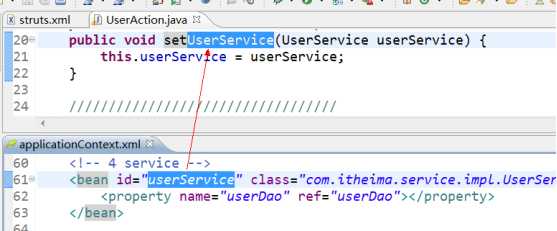
分析:
1. struts 配置文件
default.properties ,常量配置文件
struts-default.xml ,默认核心配置文件
struts-plugins.xml ,插件配置文件
struts.xml,自定义核心配置文件
常量的使用,后面配置项,将覆盖前面的。
2.default.properties ,此配置文件中确定 按照【名称】自动注入
/org/apache/struts2/default.properties

3. struts-plugins.xml ,struts整合spring
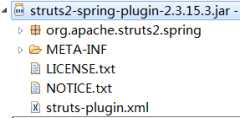
<constant name="struts.objectFactory" value="spring" />
struts的action将有spring创建
总结,之后action有spring创建,并按照名称自动注入
标签:username sub 事务配置 mit junit4 自动 win value 共享
原文地址:http://www.cnblogs.com/burningmyself/p/7253266.html